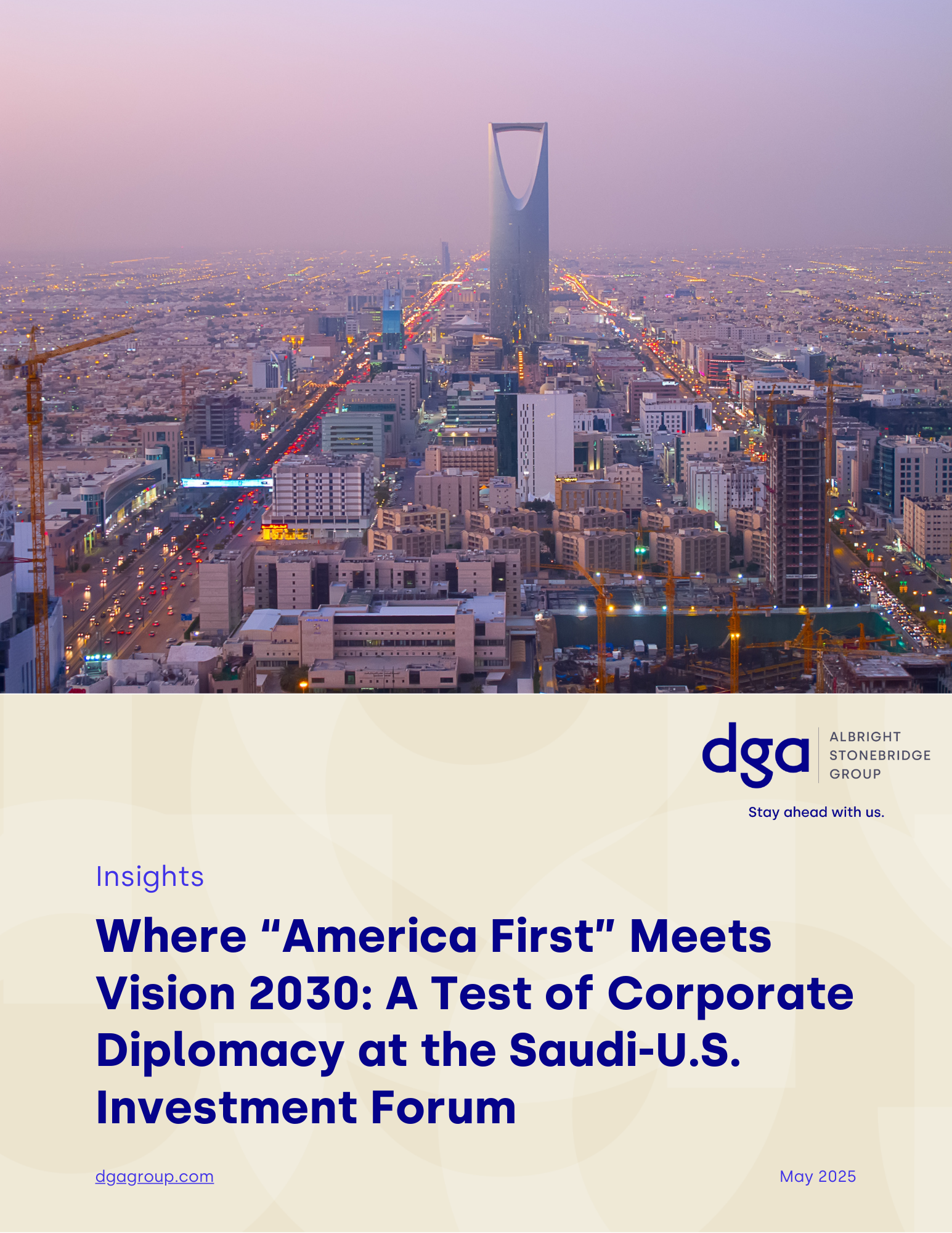Where “America First” Meets Vision 2030: A Test of Corporate Diplomacy at the Saudi-U.S. Investment Forum

President Trump’s upcoming visit to Saudi Arabia and other Gulf countries next week — his first overseas trip of his second term — follows a whirlwind first four months in office that have upended decades of U.S. trade and industrial policy and redefined America’s relationships with both allies and adversaries. The Trump administration has made clear that its top priority is to re-shore manufacturing and rebuild the U.S. industrial base, with tariffs as its tool of choice. While the Gulf states have been spared the brunt of Trump’s trade escalation, the broader shift in U.S. industrial policy poses new challenges as these countries seek to build closer economic ties with Washington. In many ways, Trump’s “America First” industrial policy advances similar goals to the localization strategies that Gulf countries — particularly Saudi Arabia with its increasingly sophisticated framework of local content policies — have been pursuing in recent years as they seek to diversify their economies away from oil. Both sides are now focused on boosting domestic manufacturing, jobs, and exports, setting the stage for potential competition as well as opportunity.
This is the new reality that companies will face at the Saudi-U.S. Investment Forum, taking place tomorrow, May 13 in Riyadh during President Trump’s visit. The Forum — which will reportedly host the likes of the CEOs of Citigroup, BlackRock, and OpenAI — will serve as the main platform for private sector engagement during the visit and as the venue for announcing commercial deals between U.S. and Saudi companies. In recent weeks, both sides have been compiling deals across different sectors including healthcare, technology, infrastructure, mining and minerals, energy, and defense — from finalized agreements to near-term signings and early-stage MOUs. Both sides are eager to maximize the total value of bilateral deals, aiming to get as close as possible to the ambitious $600 billion to $1 trillion target over four years discussed between HRH Crown Prince Mohammed bin Salman and President Trump earlier this year.
To fully leverage the opportunity created by the Forum and the broader spotlight of President Trump’s visit, companies will need to navigate the growing overlap, and occasional tension, between the two countries’ industrial policy priorities. U.S. firms investing in the Kingdom should demonstrate how their presence supports economic growth and job creation back home, just as Saudi firms investing in the U.S. should underscore how their moves align with the Kingdom’s long-term localization goals. For example, an American company establishing a local manufacturing facility in Saudi Arabia might rely on U.S.-made technology, raw materials, and expertise. A Saudi investment in the United States could enable the co-development of technologies and capabilities in strategic sectors that support the Kingdom’s long-term industrial growth. These kinds of investments aren’t zero-sum; they deliver shared value for both economies. Above all, companies from both countries should approach engagement in the spirit of true partnership and embrace the reality that success on one side can and should mean success on both sides.
Regardless of whether they have deals to announce, U.S. and Saudi companies can use the Forum to advance their commercial objectives. More than the formal program, the Forum’s real value will lie in the networking: it will bring together American and Saudi senior government officials and corporate executives, offering companies a chance to connect with potential partners and have informal conversations with stakeholders important to their long-term business success. For firms newer to the Kingdom, the Forum offers a front-row seat to Saudi Arabia’s transformation and a chance to gain a deeper understanding of the Kingdom’s ambitions under Vision 2030. Moreover, companies should treat the Forum as a springboard for sustained engagement, not a one-off event, as momentum around the U.S.-Saudi economic relationship will likely continue, bringing further opportunities to close deals in the months and years ahead.
About DGA Group
DGA Group is a global advisory firm that helps clients protect – and grow – what they have built in today’s complex business environment. We understand the challenges and opportunities in an increasingly regulated and interconnected world. Leveraging the expertise and experience of our team at Albright Stonebridge Group, a leader in global strategy and commercial diplomacy, and a deep bench of communications, public affairs, government relations and business intelligence consultants, we help clients navigate and shape global policy, reputational and financial issues. To learn more, visit dgagroup.com.
For additional information or to arrange a follow-up, please contact Michael.Bessey@dgagroup.com.